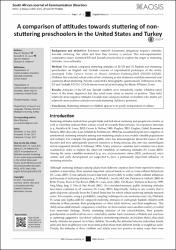| dc.contributor.author | Weidner, Mary E. | |
| dc.contributor.author | St Louis, Kenneth O. | |
| dc.contributor.author | Nakışcı, Egemen | |
| dc.contributor.author | Özdemir, Ramazan Sertan | |
| dc.date.accessioned | 10.07.201910:49:13 | |
| dc.date.accessioned | 2019-07-10T20:03:05Z | |
| dc.date.available | 10.07.201910:49:13 | |
| dc.date.available | 2019-07-10T20:03:05Z | |
| dc.date.issued | 2017 | en_US |
| dc.identifier.citation | Weidner, M. E., St Louis, K. O.,Nakışcı, E. ve Özdemir, R. S. (2017). A comparison of attitudes towards stuttering of non-stuttering preschoolers in the United States and Turkey. South African Journal of Communication Disorders, 64(1). https://dx.doi.org/10.4102/sajcd.v64i1.178 | en_US |
| dc.identifier.issn | 0379-8046 | |
| dc.identifier.issn | 2225-4765 | |
| dc.identifier.uri | https://dx.doi.org/10.4102/sajcd.v64i1.178 | |
| dc.identifier.uri | https://hdl.handle.net/20.500.12511/3802 | |
| dc.description | WOS: 000401198900001 | en_US |
| dc.description | PubMed ID: 28470081 | en_US |
| dc.description.abstract | Background and objectives: Extensive research documents ubiquitous negative attitudes towards stuttering, but when and how they develop is unclear. This non-experimental, comparative study examined US and Turkish preschoolers to explore the origin of stuttering attitudes cross-culturally. Method: The authors compared stuttering attitudes of 28 US and 31 Turkish non-stuttering preschoolers on English and Turkish versions of experimental prototypes of the newly developed Public Opinion Survey on Human Attributes-Stuttering/Child (POSHA-S/Child). Children first watched a short video of two stuttering avatar characters and then answered oral questions about stuttering. Parents completed a demographic questionnaire. Differences in the US and Turkish POSHA-S/Child means were calculated using the Mann-Whitney U test. Results: Attitudes of the US and Turkish children were remarkably similar. Children rated most of the items negatively but also rated some items as neutral or positive. They held relatively more negative attitudes towards traits and personalities of children who stutter yet relatively more positive attitudes towards stuttering children's potential. Conclusion: Stuttering attitudes in children appear to be partly independent of culture. | en_US |
| dc.language.iso | eng | en_US |
| dc.publisher | Aosis | en_US |
| dc.rights | info:eu-repo/semantics/openAccess | en_US |
| dc.subject | Attitudes Towards Stuttering | en_US |
| dc.subject | Non-Stuttering Preschoolers | en_US |
| dc.subject | United States | en_US |
| dc.subject | Turkey | en_US |
| dc.title | A comparison of attitudes towards stuttering of non-stuttering preschoolers in the United States and Turkey | en_US |
| dc.type | article | en_US |
| dc.relation.ispartof | South African Journal of Communication Disorders | en_US |
| dc.department | İstanbul Medipol Üniversitesi, Sağlık Bilimleri Fakültesi, Dil ve Konuşma Terapisi Bölümü | en_US |
| dc.authorid | 0000-0001-6721-3981 | en_US |
| dc.identifier.volume | 64 | en_US |
| dc.identifier.issue | 1 | en_US |
| dc.relation.publicationcategory | Makale - Uluslararası Hakemli Dergi - Kurum Öğretim Elemanı | en_US |
| dc.identifier.doi | 10.4102/sajcd.v64i1.178 | en_US |
| dc.identifier.scopusquality | Q4 | en_US |


















